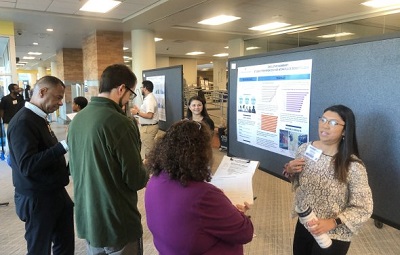Promoting Inclusion of Individuals with Moderate to Severe Post-Stroke Aphasia in Interdisciplinary Stroke Rehabilitation Research
Description/Abstract/Artist Statement
Every 40 seconds, someone has a stroke. Only 10% fully recover, making stroke the leading cause of serious long-term disability in the U.S. (https://www.cdc.gov/stroke/facts.htm). Thirty percent of stroke survivors experience aphasia, a long-term chronic condition affecting a person’s spoken and written language comprehension and expression. Rehabilitation priorities reported by persons with aphasia include support for social engagement. Community-based interventions are rare; therefore, the efficacy and effectiveness of interventions in real-life contexts are unknown. While impairment-based intervention includes persons with moderate to severe aphasia, interdisciplinary stroke rehabilitation research often excludes these individuals from participation due to their communication impairment. Access to aphasia-friendly resources by persons with aphasia, care partners, researchers, and healthcare providers addresses the knowledge and access barrier. We created an aphasia-friendly website with resources to increase awareness of the condition, communication strategies, and advocacy for inclusion in research activities. In preparation for a community-based research study about social engagement in poststroke aphasia, materials for recruitment, consent, and participation were created and will be shared as examples to promote the inclusion of individuals with moderate to severe aphasia in interdisciplinary stroke rehabilitation research.
Faculty Advisor/Mentor
Dr. Rachel Johnson
Faculty Advisor/Mentor Department
Communication Sciences and Disorders
College Affiliation
Ellmer College of Health Sciences
Presentation Type
Poster
Disciplines
Communication Sciences and Disorders | Speech Pathology and Audiology
Session Title
Poster Session
Location
Learning Commons Lobby @ Perry Library
Start Date
3-30-2024 8:30 AM
End Date
3-30-2024 10:00 AM
Upload File
wf_yes
Promoting Inclusion of Individuals with Moderate to Severe Post-Stroke Aphasia in Interdisciplinary Stroke Rehabilitation Research
Learning Commons Lobby @ Perry Library
Every 40 seconds, someone has a stroke. Only 10% fully recover, making stroke the leading cause of serious long-term disability in the U.S. (https://www.cdc.gov/stroke/facts.htm). Thirty percent of stroke survivors experience aphasia, a long-term chronic condition affecting a person’s spoken and written language comprehension and expression. Rehabilitation priorities reported by persons with aphasia include support for social engagement. Community-based interventions are rare; therefore, the efficacy and effectiveness of interventions in real-life contexts are unknown. While impairment-based intervention includes persons with moderate to severe aphasia, interdisciplinary stroke rehabilitation research often excludes these individuals from participation due to their communication impairment. Access to aphasia-friendly resources by persons with aphasia, care partners, researchers, and healthcare providers addresses the knowledge and access barrier. We created an aphasia-friendly website with resources to increase awareness of the condition, communication strategies, and advocacy for inclusion in research activities. In preparation for a community-based research study about social engagement in poststroke aphasia, materials for recruitment, consent, and participation were created and will be shared as examples to promote the inclusion of individuals with moderate to severe aphasia in interdisciplinary stroke rehabilitation research.


